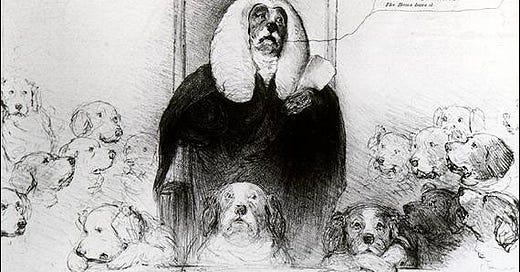The celebrated editorial cartoon by the caricaturist John Doyle depicted what he imagined the House of Assembly might look like in Newfoundland, were the British government to grant the Newfoundlanders some form of self-government, as they eventually did some months after the cartoon appeared in March 1832.
Throughout its history the Newfoundland legislature has looked sometimes like a pack of dogs arguing among themselves. Some times the disagreements came to blows.
But these days, the House of Assembly sounds more like a pack of basenji, a small dog from North Africa that does not bark at all.
Or to borrow another animal reference from Denis Healey, the former British Labour minister in two administrations, who likened debating with Conservative Geoffrey Howe to being savaged by a dead sheep. Now imagine 40 Howes in one room.
Unlike dead sheep, politicians do make noise in Newfoundland and Labrador, but they are largely ineffective at what they are supposed to be doing.
In a democracy, government authority comes from the will of the people.
People express their will not only in elections but through participation in all aspects of the political process. They can join political parties, run as candidates, give money to support candidates and parties, among other things.
Their delegates - the people who sit in legislatures - express the will of those who elected them, as well. That doesn’t mean the elected people do exactly as voters might want all the time. That isn’t really practical. Most people do other things with their lives. That’s why they elect people to stand in for them, to act as their proxies, to make decisions on their behalf. Make no mistake, though, the delegates are still reflecting – or are supposed to reflect – public will.
That’s why the government can only spend money approved by the legislature. That’s why the legislature approves or disapproves of laws or changes to existing laws and does so after public debate, detailed examination by committees, and so on.
And it’s also why, if you want to manage democracy in Newfoundland and Labrador, you need to manage the House of Assembly. You have some help from the attitudes about politics and politicians that carry on today from Newfoundland and Labrador before 1934. They let you reduce the House not only in public eyes but in practical ways as well. You can open the legislature for as little time as you can, reduce the number of laws debated, for how long they are debated, and so on, and you can also reduce the number people elected to the House.
Keep reading with a 7-day free trial
Subscribe to Bond Papers to keep reading this post and get 7 days of free access to the full post archives.




